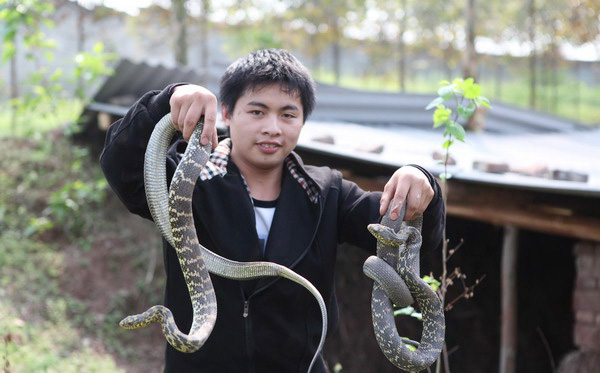Taking a bite out of the market for snakes
|
 A farmer showing snakes he breeds at his snake farm in Chongqing. Snake farming is a big business in China. In Zisiqiao, a small village measuring just 0.9 square kilometers in East China's Zhejiang province, residents farm 4 million serpents. It has earned the reputation as China's No 1 snake village. Most villagers have an annual income of 50,000 yuan ($7,937) to 60,000 yuan. [Photo / China Daily] |
Zhejiang villagers build a serpent industry with output reaching 60m yuan in 2012
Snakes, one of the world's most feared creatures, have changed Yang Hongchang's life and brought fortune to his home village in East China's Zhejiang province.
Dubbed the snake king, 62-year-old Yang is running a business worth tens of millions of yuan by raising more than 20,000 serpents. Some, including highly poisonous vipers and cobras, are sources of medicine and food. Others form part of a snake culture museum.
At Yang's snake farm, hundreds of the reptiles squirm in dry ponds prevented from escape by 0.8-meter-tall brick walls. They have one of the largest number of collective nouns in English: a bed, a den, a knot, a nest or a pit of snakes.
Yang recalled when he started raising the slithery creatures in his courtyard. The snakes often escaped from the ponds on summer nights. "When I woke up, I would find snakes on my pillow, on my bed, in my shoes. It was really horrible. But gradually I got used to them and they became less terrifying."
Herbal medicine and blood serum are used as antidotes to snake bites.
Nearly four decades ago, Yang was a farmer in Zisiqiao village in Deqing county, Zhejiang province. The harvest from the infertile land barely fed the villagers that mainly relied on farming.
Unfortunately, Yang, the only person able to work in his poverty-stricken family, caught a spondylitis disease that caused severe pain to his waist.
"Farm work had to be done despite the pain because my wife was ill and two children were young. I eventually found it impossible to sleep at night due to the pain," Yang said.
A doctor suggested he should try medicinal wine made from the red-banded snake. Unable to afford to buy snakes from the market, where they sold for more than 100 yuan ($16) for enough to make a bottle of snake wine, Yang decided to catch snakes in the mountains near the village.
He found many villagers had already been catching snakes and sold snake gallbladders to animal vendors. The gallbladder is a valuable traditional Chinese medicine that is believed to be effective in curing lung diseases, rheumatoid arthritis and other ailments.
Snake wine cured Yang's disease but he began to worry about the snakes. "I was thinking how we could sustain the industry if we continued catching wild snakes and put them in danger of extinction," he said.
In 1985, Yang borrowed 10,000 yuan and started the then unprecedented experiment of breeding snakes in the 60-square-meter courtyard of his house.
After initial failure, he eventually successfully incubated about 30,000 snake eggs and sold baby snakes for more than 80,000 yuan in 1987, which was quite a large sum at a time when most families earned no more than 100 yuan a month.
"The news stirred the whole village," he recalled. Inspired by Yang's success, more villagers invested in snake breeding.























